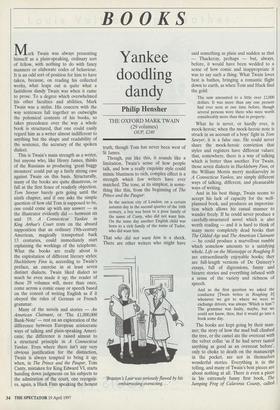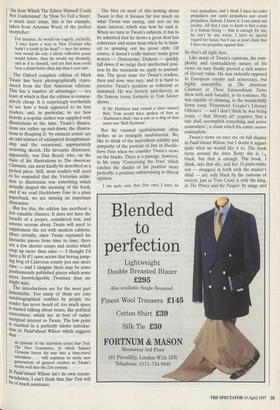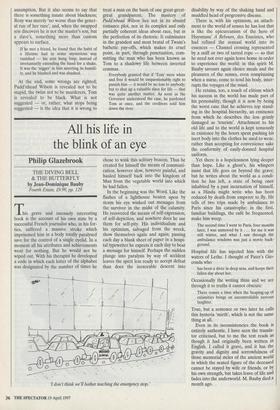BOOKS
Yankee doodling dandy
Philip Hensher
THE OXFORD MARK TWAIN (29 volumes) OUP, £240 Mark Twain was always presenting himself as a plain-speaking, ordinary sort of fellow, with nothing to do with fancy manners or elaborate codes of behaviour. It is an odd sort of position for him to have taken, because, on reading his collected works, what leaps out is quite what a fastidious dandy Twain was when it came to prose. To a degree which overwhelmed his other faculties and abilities, Mark Twain was a stylist. His concern with the way sentences fall together so outweighs the polemical contents of his books, so takes precedence over the way a whole book is structured, that one could easily regard him as a writer almost indifferent to anything but the shape and readability of the sentence, the accuracy of the spoken dialect.
This is Twain's main strength as a writer, but anyone who, like Henry James, thinks of the Russians as producing 'great baggy monsters' could put up a fairly strong case against Twain on this basis. Structurally, many of the books are quite disastrous, or fall at the first fence of readerly objection. Tom Sawyer barely gets going until the ninth chapter, and if one asks the simple question of how old Tom is supposed to be, one could come up with any answer — as the illustrator evidently did — between six and 19. A Connecticut Yankee in King Arthur's Court rests on the absurd supposition that an ordinary 19th-century American, magically transported back 13 centuries, could immediately start explaining the workings of the telephone. What the books are really about is the exploitation of different literary styles; Huckleberry Finn is, according to Twain's preface, an exercise in at least seven distinct dialects. Twain liked dialect so much he even made it up; the reader of these 29 volumes will, more than once, come across a comic essay or speech based on the conceit of writing English as if it obeyed the rules of German or French grammar.
Many of the novels and stories — An American Claimant, or 'The £1,000,000 Bank-Note' — rest on an exploration of the difference between European aristocratic ways of talking and plain-speaking Ameri- cans; the difference is raised almost to a structural principle in A Connecticut Yankee. Even where there isn't any very obvious justification for the distinction, Twain is always tempted to bring it up; when, in The Prince and the Pauper, Tom Canty, mistaken for King Edward VI, starts handing down judgments on his subjects to the admiration of the court, one recognis- es, again, a Huck Finn speaking the honest truth, though Tom has never been west of St James.
Though, put like this, it sounds like a limitation, Twain's sense of how people talk, and how a really exquisite style could mimic bluntness to rich, complex effect is a strength which few writers have ever matched. The tone, at its simplest, is some- thing like this, from the beginning of The Prince and the Pauper
In the ancient city of London, on a certain autumn day in the second quarter of the 16th century, a boy was born to a poor family of the name of Canty, who did not want him. On the same day another English child was born to a rich family of the name of Tudor, who did want him.
That who did not want him is a shock. There are other writers who might have 'Braxton's Lear was seriously flawed by his embarrassing overacting. . . ' said something as plain and sudden as that — Thackeray, perhaps — but, always, before, it would have been wedded to a sense of how comic and inappropriate it was to say such a thing. What Twain loves best is bathos, bringing a romantic flight down to earth, as when Tom and Huck find the gold:
The sum amounted to a little over 12,000 dollars. It was more than any one present had ever seen at one time before, though several persons were there who were worth considerably more than that in property.
What he is never, or hardly ever, is mock-heroic; when the mock-heroic note is struck in an account of a boys' fight in Tom Sawyer, it is a false one. He could never share the mock-heroic conviction that styles and registers have different values; that, somewhere, there is a way of talking which is better than another. For Twain, those seven dialects in Huckleberry Finn, or the William Morris merry mediaevelry in A Connecticut Yankee, are simply different ways of talking, different, and pleasurable ways of writing.
And in his best things, Twain seems to accept his lack of capacity for the well- planned book, and produces an improvisa- tion which allows his casual manner to wander freely. If he could never produce a carefully-structured novel which is also worth reading — and it is hard to think of many more completely dead books than The Gilded Age and The American Claimant — he could produce a marvellous ramble which somehow amounts to a satisfying whole. Life on the Mississippi or Roughing It are extraordinarily enjoyable books; they are full-length versions of De Quincey's essays, full of digressions, funny and bizarre stories and everything infused with a sense of the variety and richness of speech.
And so the first question we asked the conductor [Twain writes in Roughing whenever we got to where we were to exchange drivers, was always 'Which is him'? The grammar was faulty, maybe, but we could not know, then, that it would go into a book some day.
The books are kept going by their man- ner; the story of how the mad bull climbed the tree, or the camel ate the overcoat with the velvet collar 'as if he had never tasted anything as good as an overcoat before', only to choke to death on the manuscript in the pocket, are not in themselves wonderful stories. Everything is in the telling, and many of Twain's best pieces are about nothing at all. There is even a piece in his extremely funny first book, The Jumping Frog of Calaveras County, called `An item Which The Editor Himself Could Not Understand'. In 'How To Tell a Story', a much later essay, this is his example, taken from Artemus Ward, of the perfect storyteller:
For instance, he would say eagerly, excitedly, `I once knew a man in New Zealand who hadn't a tooth in his head' — here his anima- tion would die out; a silent, reflective pause would follow, then he would say dreamily, and as if to himself, 'and yet that man could beat a drum better than any man I ever saw'.
The Oxford complete edition of Mark Twain has been photographically repro- duced from the first American editions. This has a number of advantages — not least of which is that the edition is compar- atively cheap. It is surprisingly worthwhile to see how a book appeared to its first readers, and, in particular, to see how heavily a popular author was supplied with illustrations at the time. Twain's illustra- tions are rather up-and-down; the illustra- tions to Roughing It, `by eminent artists' are an odd mixture of uninspired draughtsman- ship and the occasional, appropriately scrawling sketch. His favourite illustrator, apparently, was Dan Beard, who, on the basis of his illustrations to The American Claimant, can most kindly be described as a period piece. Still, most readers will need to be reminded that the Victorian addic- tion to illustration was something which actually shaped the meaning of the book, and if we read Huckleberry Finn in a plain Paperback, we are missing an important dimension.
But for this, the edition has sacrificed a few valuable chances. It does not have the benefit of a proper, considered text, and anyone serious about Twain will need to supplement the set with modern editions. More trivially, since Twain reprinted his favourite pieces from time to time, there are a few shorter essays and stories which Crop up more than once — I thought I'd have a fit if I came across that boring jump- ing frog of Calaveras county just one more time — and I imagine there may be some posthumously published pieces which some more knowledgeable Twainian than me Might miss.
The introductions are for the most part lamentable. Too many of them are cosy autobiographical rambles by people the reader has never heard of; too much space is wasted talking about issues, like political Correctness, which are at best of rather marginal interest to Twain. The low point is reached in a perfectly idiotic introduc- tion to Pudd'nhead Wilson which suggests that an episode of the television series Star Trek The Next Generation, in which Samuel Clemens forces his way into a time-travel adventure . . . will continue to invite new generations of general readers to Twain's works well into the 21st century. If Pudd'nhead Wilson isn't its own recom- mendation, I can't think that Star Trek will be of much assistance. The blot on most of this writing about Twain is that it focuses far too much on what Twain was saying, and not on his main interest, which was how he said it. When we turn to Twain's subjects, it has to be admitted that he shows a great deal less coherence and sense than when he is limit- ed to spinning out his prose style. Of course, it doesn't really matter; many great writers — Dostoevsky, Dickens — quickly fall down if we judge their intellectual posi- tion by the standards we apply to journal- ism. The great issue for Twain's readers, then and now, was race, and it is hard to perceive Twain's position as coherent or sustained. He was fiercely anti-slavery, as the famous ironic footnote in Tom Sawyer shows:
If Mr Harbison had owned a slave named Bull, Tom would have spoken of him as 'Harbison's Bull', but a son or a dog of that name was 'Bull Harbison'.
But his vaunted egalitarianism often strikes us as strangely insubstantial. We like to think of the marvellous solidity and sympathy of the portrait of Jim in Huckle- berry Finn when we consider Twain's views on the blacks. There is a passage, however, in his essay 'Concerning the Jews' which catches the shades of his position more perfectly; a position embarrassing to liberal opinion:
I am quite sure that (bar one) I have no race prejudices, and I think I have no color prejudices nor caste prejudices nor creed prejudices. Indeed, I know it. I can stand any society. All that I care to know is that a man is a human being — that is enough for me; he can't be any worse. I have no special regard for Satan; but I can at least claim that I have no prejudice against him.
So that's all right then.
Like many of Twain's opinions, the com- plexity and contradictory nature of his views on race finally proved a rich source of literary value. He was violently opposed to European royalty and aristocracy, but highly susceptible, as The American Claimant or Those Extraordinary Twins show with such banality, to its romance. He was capable of claiming, in the wonderfully funny essay Tennimore Cooper's Literary Offences' — and I don't think he was being ironic — that 'literary art' requires 'that a tale shall accomplish something and arrive somewhere'; a claim which his entire oeuvre contradicts.
Twain's views on race are on full display in Pudd'nhead Wilson, but I doubt it argues quite what we would like it to. The book turns around the slave Roxy; she is 1/16 black, but that is enough. The book, I think, says that she, and her 31-parts-white son — swapped at birth with the master's child — are only black by the customs of society, just as Tom Canty is only the king, in The Prince and the Pauper, by usage and assumption. But it also seems to say that there is something innate about blackness; Roxy was merely 'no worse than the gener- al run of her race', and, when the swapped son discovers he is not the master's son, but a slave's, something more than custom appears to surface.
If he met a friend, he found that the habit of a lifetime had in some mysterious way vanished — his arm hung limp, instead of involuntarily extending the hand for a shake. It was the 'nigger' in him asqerting its humili- ty, and he blushed and was abashed.
At the end, some wrongs are righted; Pudd'nhead Wilson is revealed not to be stupid, the twins not to be murderers, Tom is revealed to be black. What is not suggested — or, rather, what stops being suggested — is the idea that it is wrong to treat a man on the basis of one great-great- great grandparent. The mastery of Pudd'nhead Wilson lies not in its absurd romance plot, nor in its complex and only partially coherent ideas about race, but in the perfection of its rhetoric. It culminates in the grandest and most brutal of Twain's bathetic pay-offs, which makes its cruel point, in part, through punctuation, com- mitting the man who has been known as Tom to a shadowy life between inverted commas.
Everybody granted that if 'Tom' were white and free it would be unquestionably right to punish him — it would be no loss to anybody; but to shut up a valuable slave for life — that was quite another matter. As soon as the Governor understood the case, he pardoned Tom at once, and the creditors sold him down the river.




































































 Previous page
Previous page